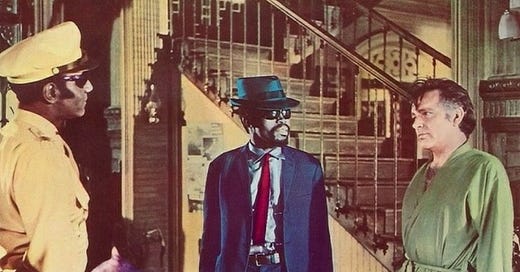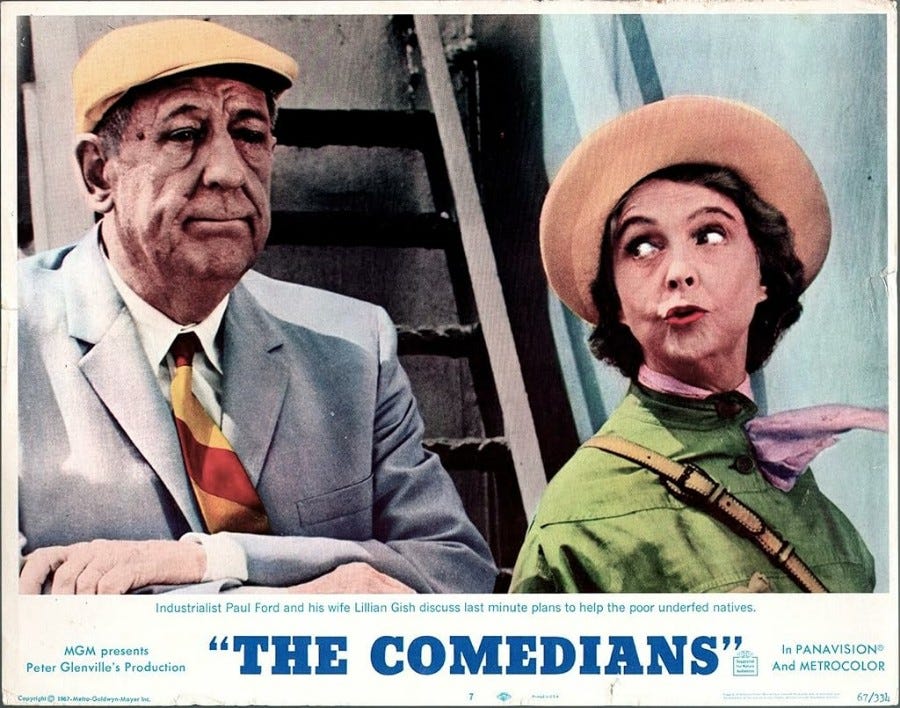Stream On: Going Greene in Haiti with ‘The Comedians’
Haiti is unfortunately no stranger to turmoil. Novelist Graham Greene wrote about it in a 1966 novel and a 1967 screenplay.
“The upheaval in Haiti has deep roots; It did not start with the latest spasm of violence at the hands of the gunmen overrunning the country. It dates back decades, to the rampant corruption of generations of politicians and oligarchs who continue to view the country as their personal fiefdoms.” (Garry Pierre-Pierre, founder/publisher of the Haitian Times in New York.)
Novelist Graham Greene traveled to Haiti in the 1950’s, during Francois “Papa Doc” Duvalier’s reign; things were no better, and he wrote The Comedians in 1966, which explores political repression and terrorism through the figure of an English hotel owner. Greene also wrote the screenplay for the 1967 Hollywood adaptation.
/Amazon /Streaming /🍅27%🍿47% /Trailer /1967 /NR
“Je suis drapeau Haitien. Un et indivisible –F. Duvalier.” (I am the Haitian flag. One and indivisible.)
As The Comedians opens, Haitian Police Captain Concasseur (Raymond St. Jacques) is studying photos on a bulletin board that appear to be of corpses, each print marked with a red “X.” The last photo is of a cheerful looking native, not a corpse—and Captain Concasseur himself takes a red marker and draws an “X” on it. He steps outside to see a ship arriving in the Gulf of Gonâve harbor, on which sits Port-au-Prince.
In the 1960’s, under the dictatorship of “Papa Doc” Duvalier and his secret police (the Tontons Macoute), Haiti has become a land of violence and terror, with only a handful of rebels daring to oppose the reign of tyranny. Because of this situation, the ship arriving at Port-au-Prince brings with it only four passengers. One of them, Brown (Richard Burton, The Spy Who Came In from the Cold), is a politically uncommitted cynic who has returned to the island to reopen his deserted hotel and to resume his affair with Martha Pineda (Elizabeth Taylor), the bored wife of a Latin American ambassador. The other three new arrivals are Mr. and Mrs. Smith (Paul Ford and Lillian Gish), an American couple who have made the trip in the hope of establishing a vegetarian center, and roguish “Major” Jones (Alec Guinness), who delights in boasting of his military experiences in Burma.
Upon stepping ashore, Jones is immediately arrested and thrown into jail; and, a short time later, Brown finds the murdered body of a former government minister lying at the bottom of his empty swimming pool.
There are parallels with other Greene books/films, especially The Quiet American: A jaded expat (apparently autobiographical to a degree) Brit in an affair with a native (or, in The Comedians, the wife of a diplomat), in a third-world country; and presciently, idealistic but ignorant Americans who wish to “save” the natives. The Comedians adds a corrupt and deadly government, based on the actual regime then in Haiti, that of “Papa Doc” Duvalier.
Duvalier’s successors have been no better than he, including during an ill-fated “democratic” period which ended with an occupation by American troops and another, hobbled by the one-two punch of a 2010 earthquake and Hurricane Sandy in 2012 and finished off by Barbeque: The most powerful man in Haiti today is gang-lord Jimmy Chirizier who goes by “Barbeque” and allegedly leads a gang of cannibals—whither the Smith characters and their dreams of a vegetarian Haiti?
Critics panned, and audiences stayed away from, The Comedians; audiences possibly because they had imagined they were going to a Taylor/Burton rom-com. (The poster above, featuring comedian Paul Ford, didn’t help.) The critics didn’t seem to be able to distinguish the black secret police onscreen from America’s own Black Panthers, who were then dominating the headlines, and in general found the film confusing. The oblivious Americans in the movie, Mr. and Mrs. Smith, might exemplify the American critical response.
But the brilliant cast including Burton, Guinness, Peter Ustinov (Topkapi) and James Earl Jones (Dr. Strangelove) pulled off a fine feat of cynical, expert Graham Greene storytelling, a cautionary tale that still rings true. Bosley Crowther wrote, in the Nov. 1, 1967 New York Times, “It is a picture to make us apprehensive. Haiti suddenly seems a bit too close.”
Sources include Yahoo! News, America Magazine, American Film Institute, and Wikipedia (CC BY-SA 4.0 DEED)
Pete Hummers is a participant in the Amazon Services LLC Associates Program, an affiliate advertising program designed to earn fees by linking Amazon.com and affiliate sites. This adds nothing to Amazon's prices. This column originally appeared on The Outer Banks Voice.




